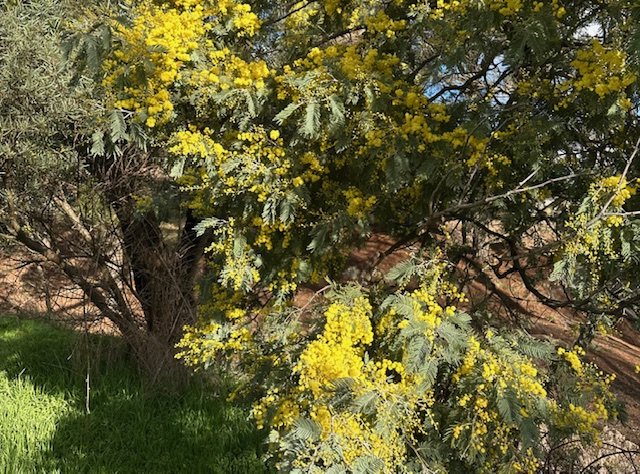On September 1st, we celebrated National Wattle Day, when the golden blooms of many local acacia species announce the start of spring. The Golden Wattle (Acacia pycnantha) is Australia’s floral emblem. Its bright, fragrant flowers against a green leafy background have become the national colours of Australia worn proudly by our sporting teams at events around the world.
And like our sporting teams, wattles have not stayed at home. Members of the Acacia genus have been planted in gardens, farms, and parks around the world, valued for their beauty, their fast growth, and their many uses.
Wattles are known internationally for their striking yellow blooms—often called “mimosa” overseas. In France and Italy, festivals each February celebrate the flowering of Acacia including Silver Wattle. Towns along the French Riviera hold “Fête du Mimosa” parades, and branches of wattle are a common gift in markets and flower shops.
In Africa, wattles have been widely planted to provide firewood, shade, windbreaks, and soil improvement. Black Wattle has been grown for its tannin-rich bark, an important ingredient in leather production.
In South America and India, wattle plantations provide timber, pulp, and gum. Wattles are also valued for land rehabilitation, helping to stabilize degraded soils and re-green dry landscapes. Their ability to grow quickly and fix nitrogen in the soil makes them attractive for restoring marginal land.
Internationally, wattles are often seen as symbols of optimism. In Japan, wattle branches are exchanged as tokens of friendship. In Italy, wattle flowers are given to women on International Women’s Day as a gesture of respect and solidarity.
For many communities even outside Australia, wattles mark the changing of seasons, providing colour and scent when other plants are still bare. They support bees and insects, and their fast growth provides habitat for birds and small animals.
The very qualities that make wattles so successful—fast growth, tolerance of poor soils, abundant seeds—can also make them a problem outside their natural range.
In parts of South Africa, New Zealand, Portugal, and California, some species are officially listed as environmental weeds. They can crowd out local plants, increase fire risk, and use up scarce water. In these regions, control programs are in place to reduce their spread.
These challenges are reminders that even our own beloved plants need careful management when grown outside their natural environment.
Wattles remain one of Australia’s great gifts to the world. They bring colour, fragrance, and practical benefits wherever they grow. And like our eucalypts, they remind us of home when we travel abroad.






